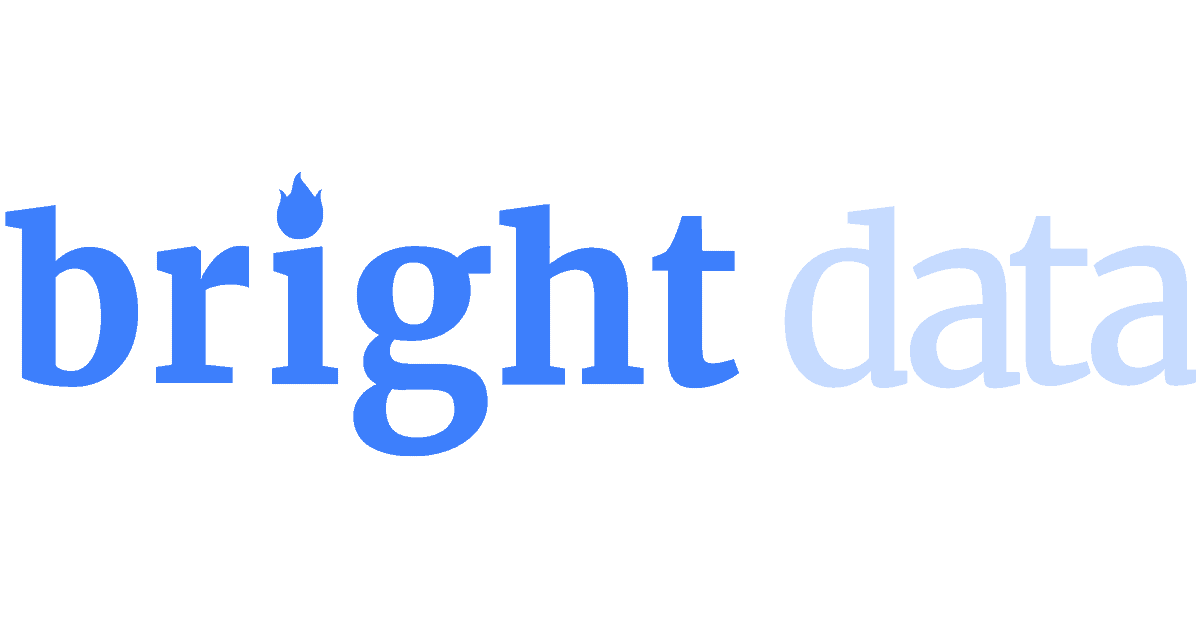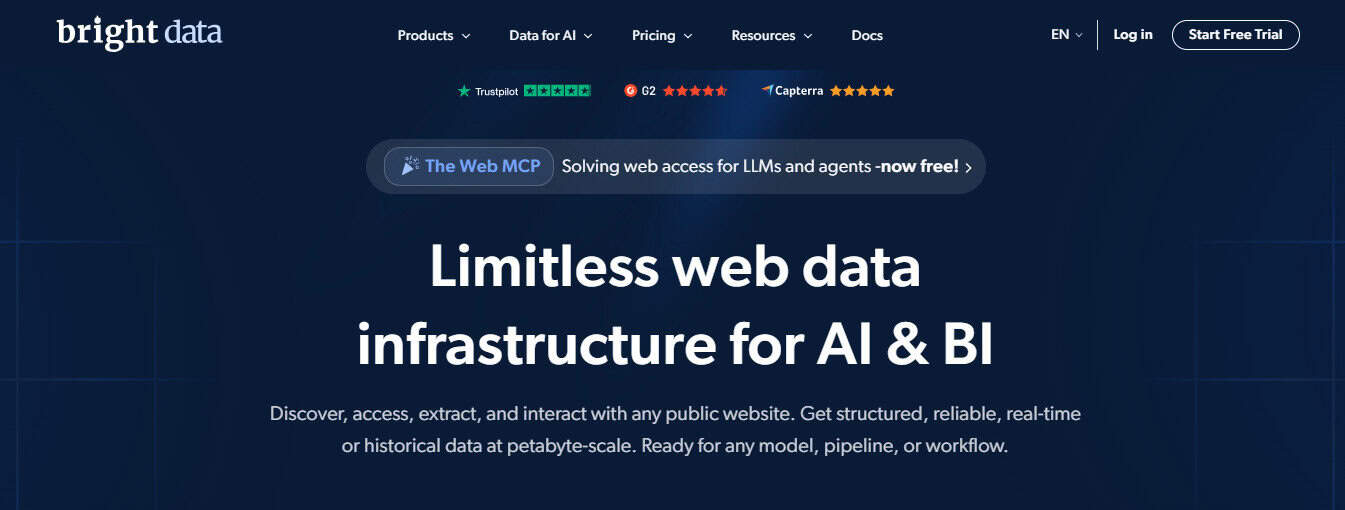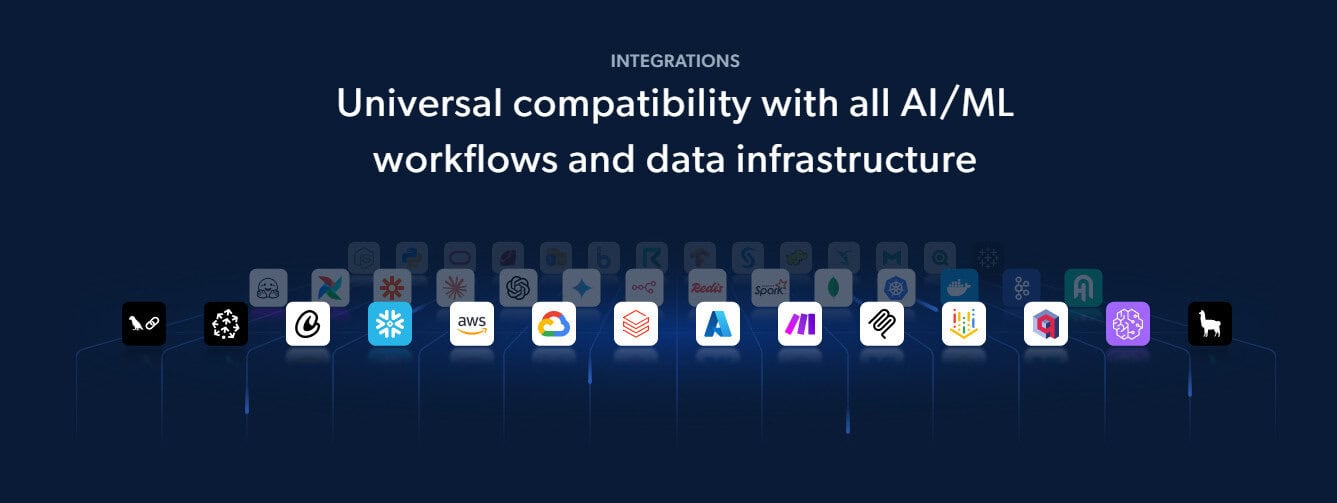Last Updated on October 6, 2025 by Ewen Finser
In my years consulting for tech firms, I’ve seen situations where Oxylabs was the right choice for operations like data collection projects. But I’ve also encountered situations where businesses struggled with Oxylabs’ limitations.
While this provider has an excellent reputation in the enterprise space, it mainly focuses on large-scale projects and premium prices. Under these circumstances, it’s better to consider some viable alternatives.
Why would you need an Oxylabs alternative?
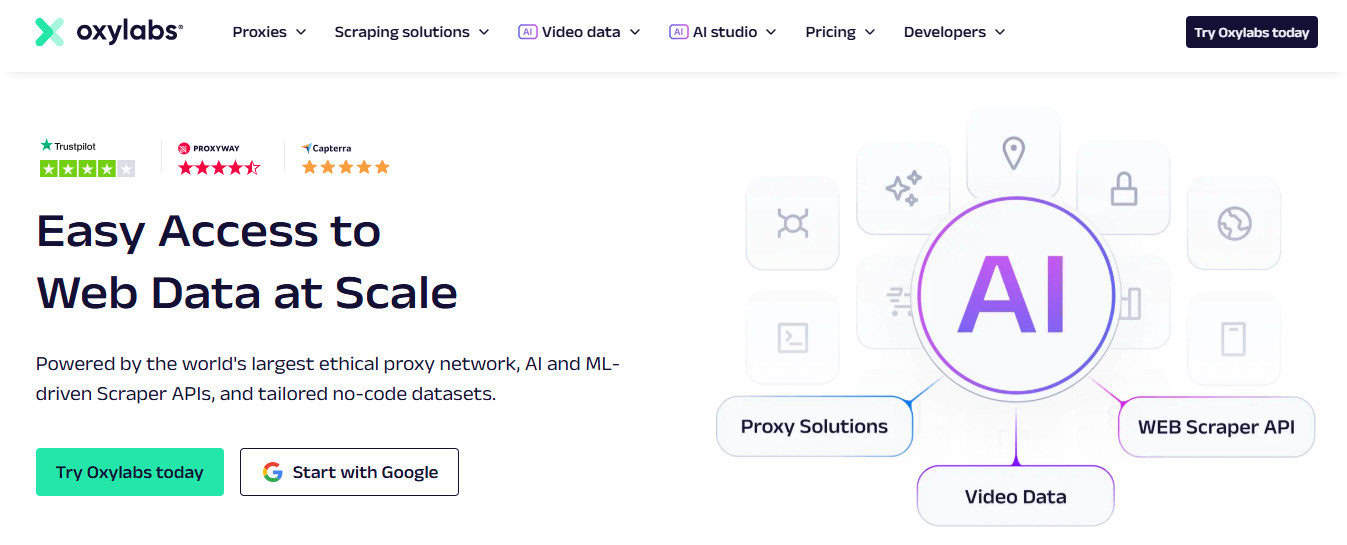
Enterprise focus
I mentioned Oxylabs ‘premium prices’ as they don’t offer the best value for money unless you’re engaged in a fairly large operation. For instance, the standard ‘pay as you go’ price for residential proxies is $8/GB for up to 50 GB of traffic per month. While there’s currently a coupon code you can input to get 50% off, it’s still prohibitively expensive for smaller businesses.
Complex pricing structure
Even if you have the budget to afford Oxylabs’ prices, I found the way it structures them to be most confusing. There are both ‘Regular’ and ‘Enterprise’ plans, which offer different prices depending on how much you want to pay.
Then you have to consider whether you will pay as you go or pay a monthly subscription. If you want an annual discount by paying for a year upfront, then you need to contact the Oxlabs sales team. This is before we get into the different rates you pay for different proxy types.
PAYG plans are non-refundable
Although there’s a 7-day free trial for all proxy plans, if you’ve already committed pay-as-you-go credit to a paid plan, you won’t receive a refund if you decide to switch providers.
Bottom Line Up Front
After testing different proxy services over the years, I find that I consistently recommend Bright Data most often to clients.
Bright Data offers the same kind of enterprise-grade reliability and extensive IP coverage as Oxylabs, but has a much more transparent pricing structure.
It offers a pay-as-you-go model at competitive rates, plus its subscriptions are also reasonably priced. Bright Data also offers all four main proxy types: residential, data center, mobile, and ISP via a centralized platform.
Whenever I need to grab structured web data, real-time or historical, I use Bright Data. It makes it easy to pull info from public websites at scale, and it fits right into whatever AI model or workflow I’m working on. Fast, flexible, and super reliable.
Like Oxylabs, there’s a 7-day free trial but Bright Data also offers a ‘freemium’ tier of up to 15 data center IPs with 2 GB of traffic per month, so you can test it for longer without providing payment information.
Bright Labs also offers 99.95% success rate, excellent response times, and granular (ZIP code level) geographic targeting.
This said, the best proxy provider is the one that meets your operational requirements, budget, and preferences. Read on for a more in-depth analysis of Oxylabs alternatives.
Top 5 Oxylabs alternatives
1. Bright Data
Pros
- Huge pool of over 150 million IPs across 195 countries
- 99.95% success rate
- Geo-targeting down to ZIP code
- Flexible pricing model
- Free trial and freemium tier
- Advanced proxy management tools
Cons
- Premium pricing for residential proxies
- Business email required for registration in the past
I stated above that Bright Data is my go-to recommendation for clients, as I feel it’s the most comprehensive alternative to Oxylabs – even for large-scale operations.
Although standard pricing for residential proxies is $8.20/GB for ‘pay as you go’, there’s currently a 50% discount on all plans (in this case $4.20/GB), putting Bright Data’s rates on a par with Oxylabs’.
During my tests with both platforms, I found that Bright Data’s residential proxies had better success rates, especially when visiting sites with sophisticated anti-bot scripts.
I also found Bright Data’s ‘Proxy Manager’ dashboard easy to navigate – there’s even a Chrome extension to load it quickly. From here, you can easily set up proxies, monitor their health, configure ports, etc.
As I said, there’s a 7-day free trial, but if you want to keep tinkering with Bright Data after this, you can also subscribe to the ‘freemium’ plan to get 15 data center IPs and 2GB of traffic without providing any payment information.
Read our full review here: Bright Data Review: Why I Think it’s Worth the Price Tag
Why it’s better than Oxylabs: Aside from the superior success had with Bright Data’s residential proxies vs. Oxylabs’, the platform delivers enterprise-grade performance, its pricing is transparent, the interface is intuitive, and you have plenty of time to try it out free of charge to check if it’s a good fit for your project requirements.
2. Webshare
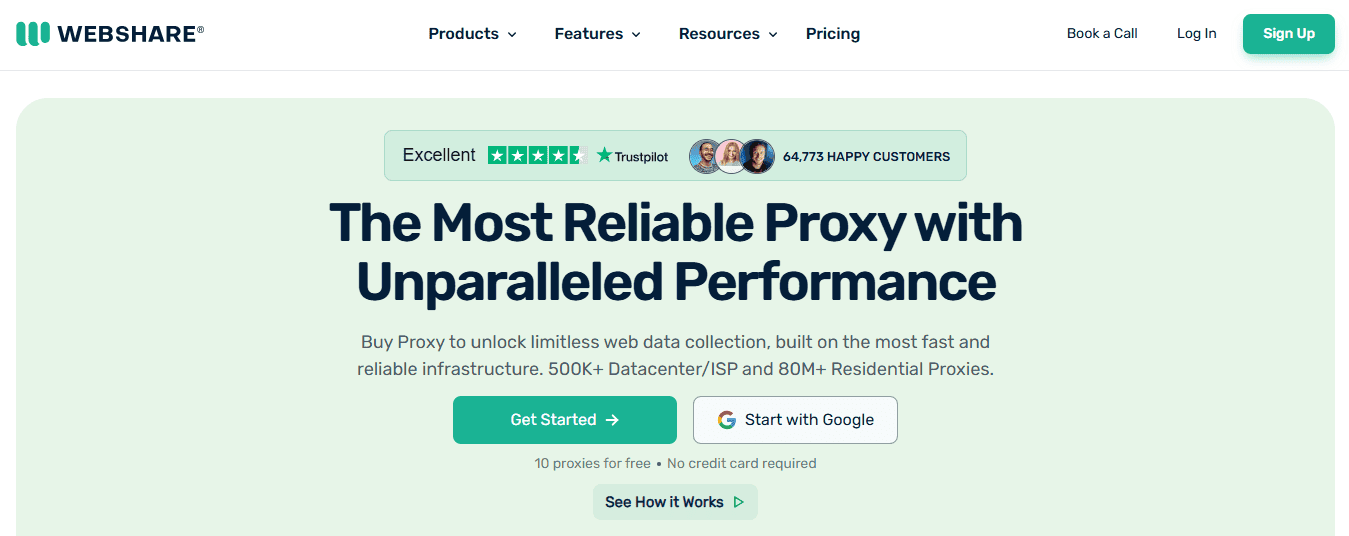
Pros
- Extremely competitive pricing
- Free plan with up to 10 proxies
- Operates independently of Oxylabs
- Simple setup
Cons
- Relatively small IP pool
- No mobile proxies
- No free trial for residential proxies
Webshare was founded in 2018, but was acquired in 2022 by Oxylabs. Despite being owned by another proxy provider, it still operates independently of its parent company.
The downside to this is that it doesn’t share some of Oxylabs’ more advanced features like web scraping APIs and mobile proxies.
On the plus side, Webshare’s pricing is very competitive compared to its owner. Tiers begin at just $2.99 per month for 100 proxies, and you can save another 30% on yearly subscriptions.
Better yet, there’s a free plan for up to 10 proxies and 1 GB of traffic per month. This is ideal for testing data center proxies, but there’s no free trial for Webshare’s static or rotating residential proxies, so you have to just sign up and hope for the best.
When my client and I tested the data center proxies, we found the setup process was very straightforward, and the features are clearly explained: for instance, the default number of concurrent connections is 500, though you can pay extra to upgrade this to 3000.
Webshare offers around 30 million IP addresses in 50 countries. This is a much smaller pool than top-tier proxy providers like Bright Data and Oxylabs, but the selection of countries like the USA, Canada, the UK, Germany, and so on is logical, meaning it could be suitable for smaller-scale projects.
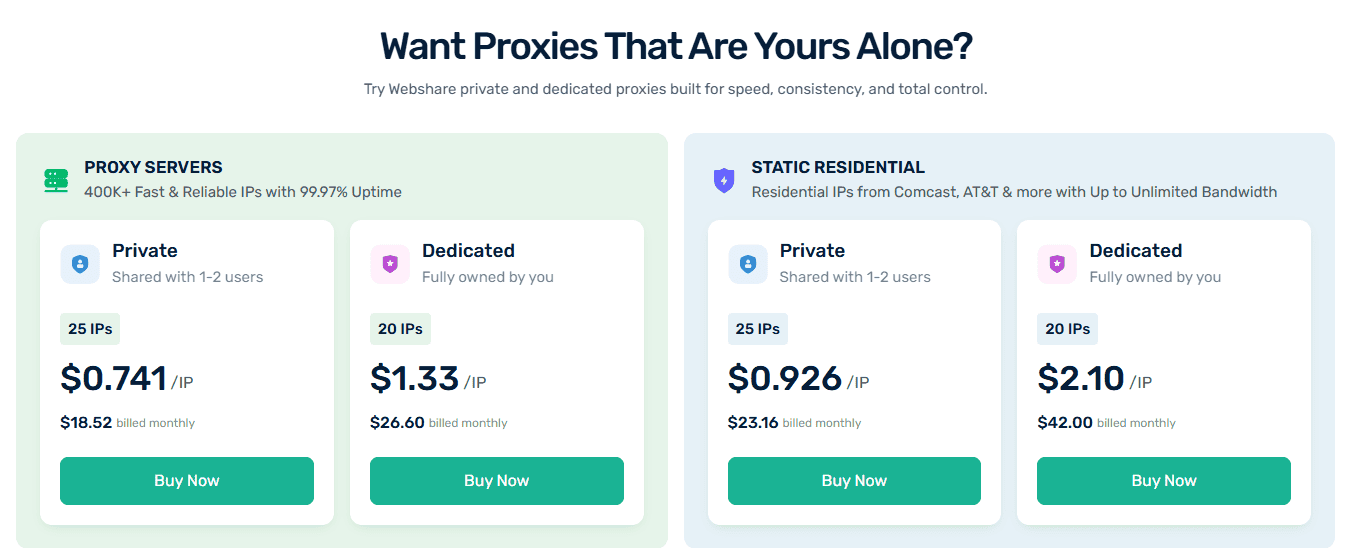
Why it’s better than Oxylabs: Webshare offers a very easy setup process, is much affordable than Oxylabs, and its pricing structure is much clearer. You can also benefit from free 10 data center proxies for testing purposes, which I found delivered excellent performance.
3. SOAX
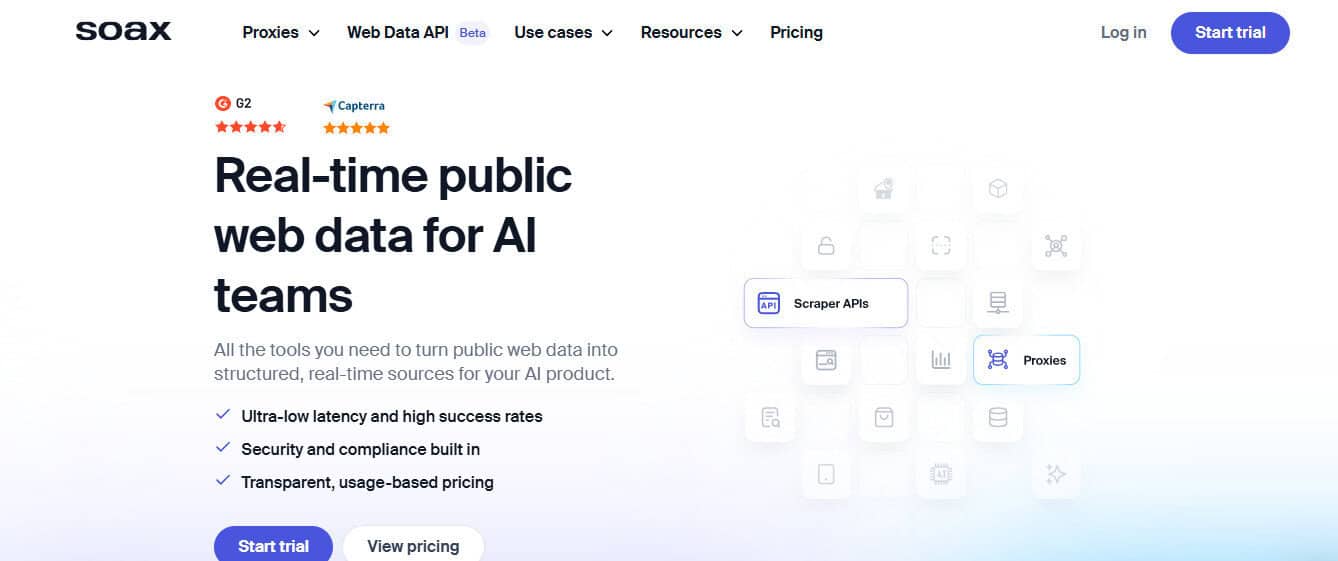
Pros
- Unified pricing for subscriptions
- 155+ Million IPs in 195+ Locations
- 99.95% success rate
- Advanced targeting by city or ASN
- Supports HTTP(S), SOCKS5, UDP, and QUIC protocols
Cons
- Minimum $90 per month
- Limited free trial (3 days / 400 MB)
- Very basic API
I first came across SOAX when working with a client who needed to switch frequently between proxy types.
As far as I can tell, the platform operates a unique pricing model in that you sign up for a monthly subscription tier, e.g. $90, though the prices of individual proxy types will vary. For instance, the $90 plan works out at $3.60/GB for 25GB of traffic for residential proxies. Or you can pay the same $90 for 145GB of traffic ($0.62/GB) for data center proxies.
The advantage of this approach is that you can use any proxy type within your subscription tier, giving SOAX more flexibility than more traditional providers like Oxylabs.
The proxies themselves are fairly easy to set up. I found in each case, you have to choose an authentication type (both password and allow lists are available). You can then configure details like IP rotation time, specific cities, ports, and so on.
The API supports basic reporting functions like fetching lists of location and ISPs, but if you want anything more advanced, then you’re out of luck. This means that SOAX is a better choice for simpler data collection operations.
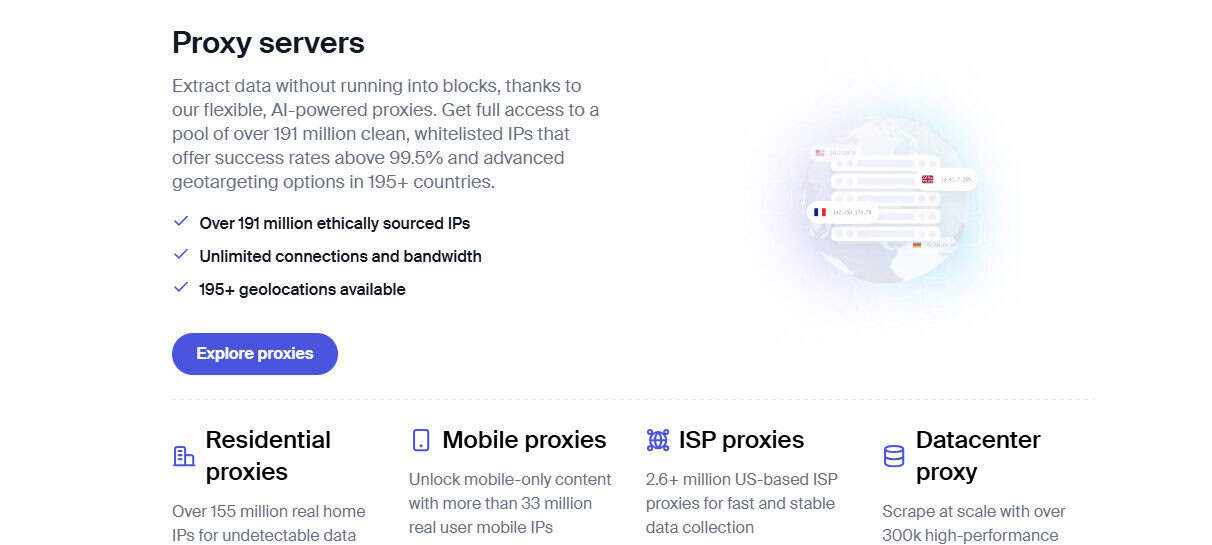
Why it’s better than Oxylabs: Aside from having a much easier to follow pricing model, SOAX is an excellent option for projects that require a more diverse proxy pool – Oxylabs’ approach to this is much more compartmentalized.
4. IPRoyal
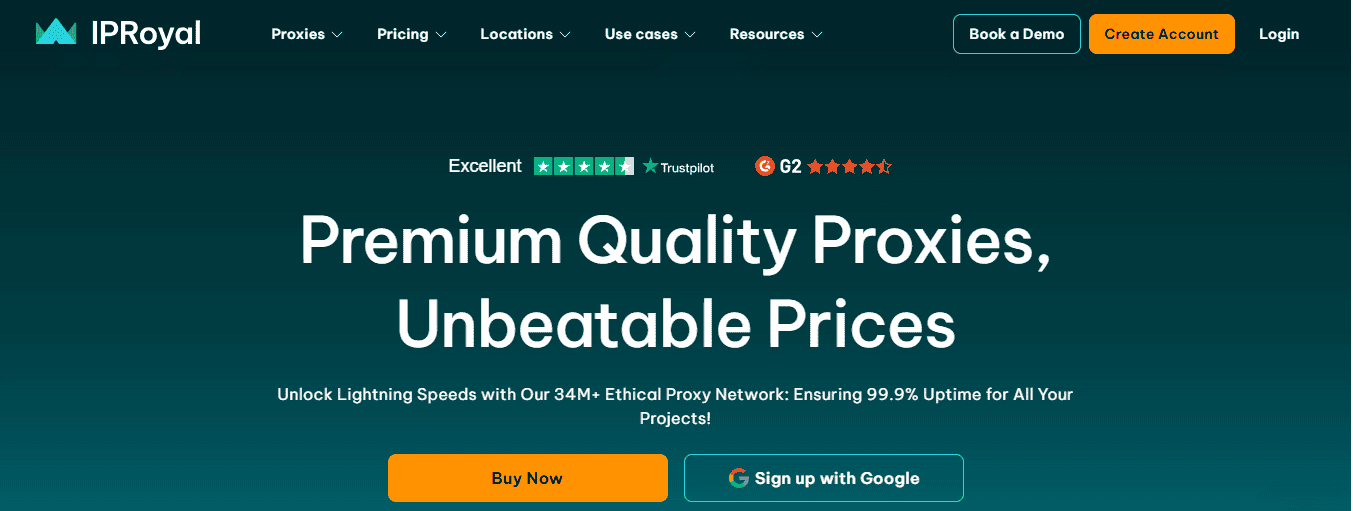
Pros
- Budget-friendly pricing
- +32 million IPs in 195 countries
- Unlimited concurrent connections
- Simple dashboard
Cons
- Free trial must be set up manually by sales team
- Limited advanced features
- Relatively low success rates
If you or a client is on a shoestring, IPRoyal is a sensible choice. Subscribers get a 5% discount relative to ‘pay as you go’ pricing, starting from $3.50/GB for residential proxies and $1.39 for data center proxies.
Aside from the competitive rates, I was first drawn to IPRoyal due to its offer of both unlimited traffic (for data center proxies) and unlimited concurrent connections.
If you do sign up for a per GB subscription, IP Royal also deploys non-expiring traffic. In other words, unused gigabytes never expire. This is in contrast to premium proxy providers, who usually reset the counter to zero at the end of the month.
I was particularly taken with IPRoyal’s browser extension too, from which you can manage multiple IP profiles, each with distinct traffic types, e.g., HTTPS.

Why it’s better than Oxylabs: IPRoyal offers much more affordable pricing and more flexible traffic policies than Oxylabs. It’s also simple to use and has a respectable-sized IP pool for a budget proxy provider.
5. Decodo (formerly Smartproxy)
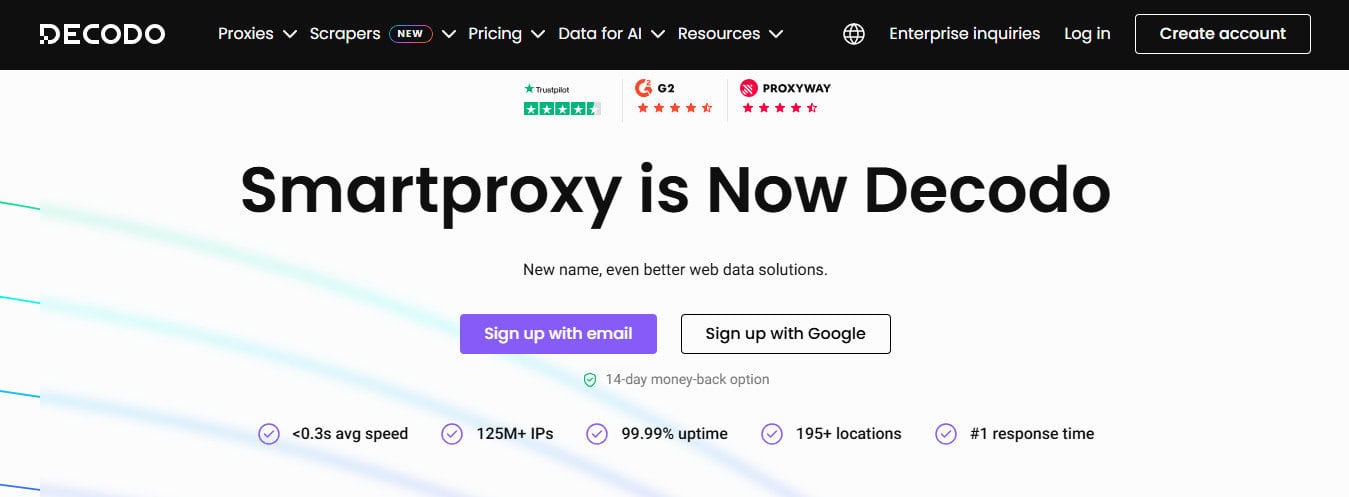
Pros
- Over 125 million IPs across 195 locations
- All four main proxy types, including mobile
- Bypass IP restrictions with ‘Site Unblocker’
Cons
- Limited locations for shared proxy plans
- Pricing model can be complex
I was originally intrigued by Decodo (or Smartproxy as it was known then) due to its ‘Site Unblocker’, which promises to bypass strict IP-blocking and anti-bot measures. During my tests with a client, I found this to be true, as we had a very high success rate – even on traditionally difficult sites. The tool also supports advanced browser fingerprinting and scraping, which you can manage from the ‘smart dashboard’.
Decodo doesn’t follow a subscription pricing model like other proxy providers. Instead, prices are based on the number of IPs you require, the amount of traffic, and the type of proxies you need.
For example, the listed price for a residential proxy is ‘from $1.50/GB’, but when I double-checked this for this review, I discovered that the lowest cost is, in fact, $3/GB – and that assumes you’re willing to pay $3,000 per month for 1,000 GB of traffic. ‘Pay as you go’ pricing is also available for $3.50 per GB. There’s a 14-day money-back guarantee if you’re not satisfied.
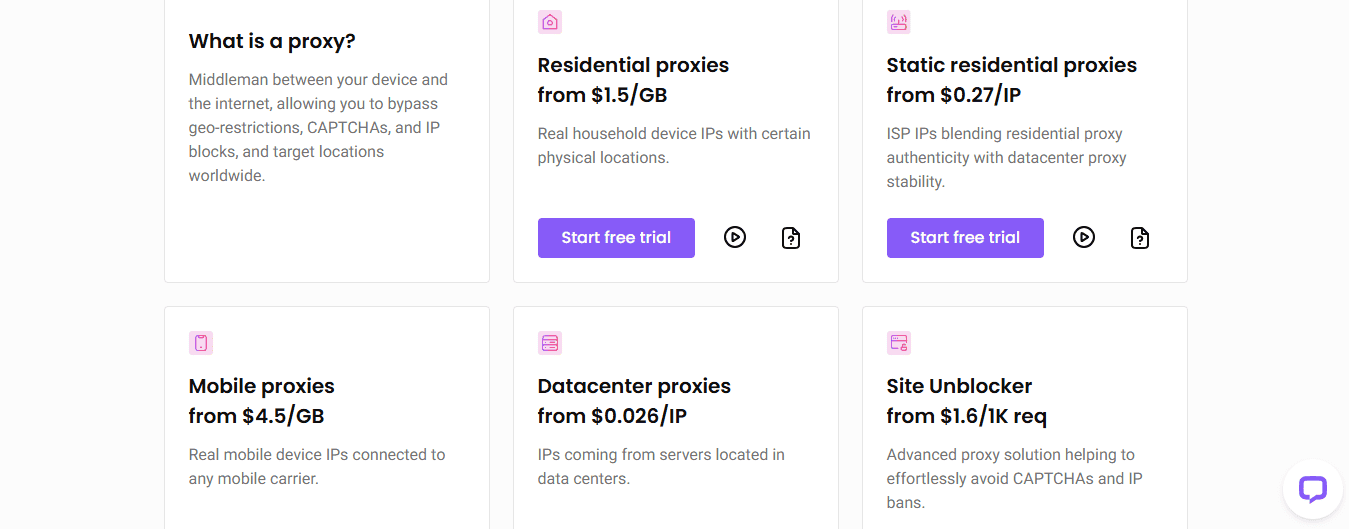
Why it’s better than Oxylabs: During my original tests, Decodo offered similar performance to Oxylabs, and though the pricing structure was just as hard to follow, it ultimately represented better value for money for my client. Decodo’s Site Unblocker is also an absolute Godsend.
Top Mistakes when Choosing a Proxy Provider
With my consulting work, I’ve seen businesses make some key errors when it comes to choosing a proxy service. Some of the more common mistakes I’ve seen include:
Focusing only on IP pool size
Oxylabs offers a staggering +175 million IP addresses worldwide, and it’s very easy to assume that bigger is always better. Still, this ignores the painful lesson I’ve learned that IP quality matters over quantity.
In fact, I’ve seen smaller providers (30 – 50 million IPs) outperform larger networks, simply because they focus on better success rates and response times. Never let marketing numbers overshadow actual performance metrics.
Choosing based on brand recognition alone
Providers like Oxylabs are a big name in the ‘proxy space’ due to its impressive size and array of awards. Still, this may not align with the requirements of your project.
Insufficient testing
While the 7-day free trial offered by Oxylabs is reasonably generous, it most likely won’t be enough if you’re engaging in wide-scale web scraping or data collection projects. This means you can lose money, given that there are no refunds for ‘pay as you go’ deposits if you decide it’s not a good fit for your company.
This is one of the reasons I’m so fond of Bright Data, as my clients can deploy some of its ‘freemium’ data center IPs to perform more extensive tests after the 7-day trial is over.
The Best Oxylabs Alternative
As I said, I’ve worked with clients who found Oxylabs to be the perfect proxy provider, as they were large enterprises with deep pockets and high-volume requirements.
If your company doesn’t fall into all three of these categories, I’d say Bright Data is a far superior alternative. It offers competitive pricing, enterprise-grade features, and top-notch performances, making it ideal for virtually any project requiring premium proxies.
Whenever I need to grab structured web data, real-time or historical, I use Bright Data. It makes it easy to pull info from public websites at scale, and it fits right into whatever AI model or workflow I’m working on. Fast, flexible, and super reliable.
However, each project has different requirements. If you’re on a tight budget, then options like Webshare and IPRoyal may be a better choice due to their lower upfront costs and extremely scalable pricing options.
I’ve found SOAX to be a good all-rounder in that it balances premium proxy features with reasonable pricing, making it suitable for small to medium data collection operations.
If this is your first operation, you may also gain some peace of mind from Docodo’s powerful Unblocker tool for bypassing CAPTCHAs and other anti-bot measures.
Before making your decision, work through the above checklist concerning common mistakes people make when choosing a proxy provider.
The most important lesson I’ve learned is don’t be taken in by a big name. Instead, focus on researching your chosen provider carefully, testing and listing its strengths, then compare them to your project requirements.
That way, you can find the proxy service that provides the best balance of performance, pricing, and flexible features.


